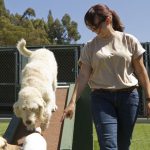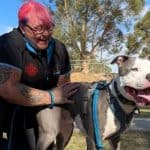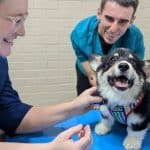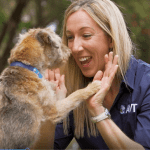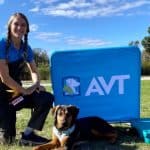Amy is a Trainer at the Dogs' Refuge Home and the founder of Muttz Matter
Ever wondered what it’s like to work as a dog trainer at a rescue? In this video, Amy, one of the trainers at the Dogs’ Refuge Home and founder of her own dog training business, Muttz Matter, shares her story.
Amy gives us an inside look at her typical day in rescue, from conducting behaviour assessments to pairing dogs with suitable companions and helping them find their forever homes. She also reflects on the challenges of kennel stress, the importance of understanding canine body language, and how studying the Certificate IV in Animal Behaviour and Training helped her transition from a kennel hand to a dog trainer. Amy’s passion for helping dogs and their owners extends beyond rescue work, as she provides one-on-one training sessions through Muttz Matter.
Whether you’re considering a career in rescue or are simply curious about the behind-the-scenes work involved, Amy’s story offers valuable insights into the world of dog training.
Here at the Dogs’ Refuge, I’m one of the trainers on the team. Here our role mostly boiled down to assessing the dogs’ behaviour and suitability for rehome, as well as just managing their day-to-day life while they’re still in rescue.
A typical day, we’re going to head down to quarantine, get out the dogs that are ready to become available, we’ll do their behaviour assessments, and pair them with a dog-walking friend if they like other dogs. We then write up their assessments, make them available and make sure we get good photos too.
From there, we can pair up other dogs up top that are in need of friends, we can adjust the dog’s handling if they’re struggling a little bit, and help adopters find the right match, or people that have already adopted with any behaviour concerns.
The most rewarding part of being a dog trainer, particularly working in rescue, is seeing these dogs achieve a loving home, and getting out, and just having an awesome life. Having the owners really invest in making sure their dogs’ welfare is met and that they’re having really good quality of life and the best chance at happiness.
I wanted to become a dog trainer because I adopted my own special dog from the shelter. I found it really challenging to find a credible dog trainer when I was new with him and had no clue, so I really wanted to be able to help people that are in a similar situation and help them with their own special dogs.
So the Cert IV course really, really helped, definitely understanding the dog’s emotions and being able to pick up on the signals they’re giving us. I think, particularly here, kennel stress plays such a big factor in their overall behaviour, so it’s really important to kind of look at, as a whole, what the dogs are displaying here might not necessarily be how they act in the home. It can be a little tricky, but definitely that education and the thorough detail we went to in the course has helped.
I think the two most important things that I learned from the course would probably be: one, body language is so, so important, and it can be really subtle, it’s really important to just look at the dog as a whole picture and really explore what signals you’re seeing and figure out the underlying emotions that the dog’s showing you. The second one is that really advanced training and good quality dog training is just the basics and the basics done really well.
I had already started working at the Dogs’ Refuge Home when I began my course, and I was working as a kennel hand, and then over the duration of my course, I started working as a trainer, getting some hands-on experience in rescue. I’ve also started my own business, where I go do one-on-one sessions and help people with their dogs.
I would say to someone who wants to work in rescue, that it is it’s extremely rewarding. There are lots of amazing people in rescue, and it’s definitely one of the best things I’ve ever done. But certainly, you need to be resilient, and you need to be prepared that there’s going to be some tough days. But at the end of it, it’s definitely all worth it.
Learn more about Animal Behaviour and Training
From Police Officer to K9 Companions: Jos Smith’s Journey in Dog Training
Jos Smith, a former Police Officer turned expert dog trainer, now leads K9 Companions Australia, a charity dedicated to pairing rescue dogs with military veterans and first responders
Want to learn more? Check out articles and news here.
Courses you may like
Start Your Journey
ACM20121 Certificate II in Animal Care (Health & Welfare)
About Animal Health & Welfare
Animal Health & Welfare
Get Certified
ACM40322 Certificate IV in Animal Behaviour and Training
About Behaviour and Training
